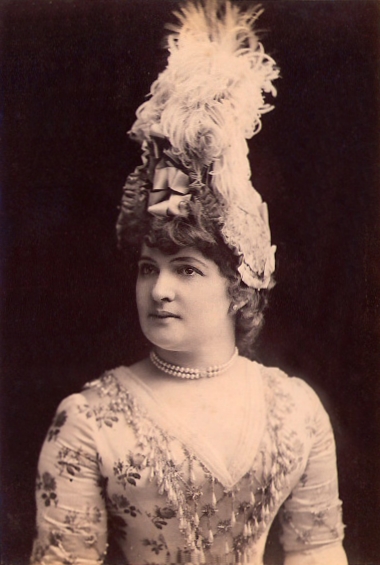 When Asa Mercer went east after the Civil War to entice young ladies to come west, he told them they would be bringing culture to the frontier. But the Mercer Belles I write about in my Frontier Bachelors series weren’t the only ones to make the rough-and-tumble West more civilized. This week’s nineteenth century heroine played a large role, in more ways than one.
When Asa Mercer went east after the Civil War to entice young ladies to come west, he told them they would be bringing culture to the frontier. But the Mercer Belles I write about in my Frontier Bachelors series weren’t the only ones to make the rough-and-tumble West more civilized. This week’s nineteenth century heroine played a large role, in more ways than one.
Fanny Morgan Phelps was born in Sydney, New South Wales. We aren’t entirely sure when, but she had already made her American debut at Maguire’s Opera House in San Francisco in 1863 as an established actress under her maiden name of Morgan. She was tall and pretty, with an impressive figure and a commanding presence. Her contemporaries called her an Amazon, and some men found themselves so upstaged by her that they refused to play opposite lest she show them up.
Fanny could not only act but sing, specializing at first in shorter plays that highlighted her comedic talents. Reviewers did not seem to know how to take her, for she was called Irish, Australian, and Scottish at various times. Take this piece from the New York Clipper (courtesy of Music in Gotham: The New York Scene 1862-75) when she played at the Bowery Theatre in 1867:
In personal appearance she is very prepossessing, and she has the power of covering up the deficiencies of those around her by her admirable rendition of characters in which she appears. Her singing is invariably encored…Her style is free, natural, and full of spirit, and at once wins the favor of her audiences.
Sometime during her first California performances, she met Ralph Phelps, a light comedian, who appears to have been some years her senior. He had debuted in New York 1845 and travelled to California in 1854. By the time Fanny joined the Ward Company in Victoria, British Territories, in 1863, she had married Phelps.
For the next 3 years, Fanny was the star of the company, delighting audiences with most of her performances (although a comedy that poked fun of Westerners was not well received, particularly as those in Victoria saw themselves as more educated, enlightened, and sophisticated than the frontiersmen in the Puget Sound area). Ralph was the theatre manager. But as depression loomed in the area, Ward decided to move his company to Portland. Fanny went along.
She didn’t stay there. She was willing to go wherever audiences had a yearning for the theatre. She played what were considered the smaller towns in the Puget Sound area at the time—Seattle and Port Gamble among them. She played at the larger Olympia, the state capital. In 1872, she is recorded as taking part in a benefit in Hawaii. One of the reasons the frontiersmen loved her was that she was willing to come where they were.
Sources say she leased the Theatre Royal in Victoria in 1874 for 11 months, under her own troupe called the Fanny Morgan Phelps Company. But I know she was touring during at least part of that time, for local papers herald her arrival in Seattle, where she staged the first full-length Shakespearean play ever seen in that frontier town, The Taming of the Shrew, on March 15, 1874, at Yesler’s Hall. In the upcoming Frontier Matchmaker Bride, Beth Wallin and Deputy Hart McCormick attend one of her performances. She stared in several plays before travelling north again. Popular actress Annie Pixley (at the left) shared the stage with her.
Along the way she lost Ralph but gained a daughter who she boarded out with a family near Vancouver. She later married a captain of the Royal Navy.
Fanny Morgan Phelps died in San Francisco in 1901, one of the most famous thespians of the West Coast. It was a role she was born to play.






2 comments:
Dear Regina, I have been researching the life of Fanny Morgan Phelps for a few years now and would love to share some information with you. She was born in Sydney and her younger sister, Lizzie Morgan was also an actress who toured with the Fanny Morgan Phelps Company in 1873 - 1875. They are my great grand aunts and I too, am an actress, not a professional historian. But I have been writing up the story of the aunts and I am planning a trip to Seattle this year, to follow up on research and to contact anyone studying in the same area. I was delighted to discover your blog last week and hope we can communicate soon. Its such a joy to see that someone else thinks the life of Fanny Morgan Phelps is worth telling! Kindest regards, Deborah Kennedy
Deborah, how wonderful! Fanny and her sister were fascinating women. I'm so glad you're documenting their stories.
Have you seen the Washington State Secretary of State's historical newspaper files? That's where I first ran across a mention of Fanny and her company. https://www.sos.wa.gov/library/newspapers/newspapers.aspx
Also, if you go to this blog post: http://nineteenteen.blogspot.com/2017/03/move-over-seattle-make-way-for-railroad.html, you'll see mention of a Tacoma newspaper account claiming a thespian troupe met its demise after leaving Seattle. The story was a hoax, but, based on the date, I believe it was Fanny's troupe they were prematurely declaring dead!
Best wishes on your studies!
Post a Comment